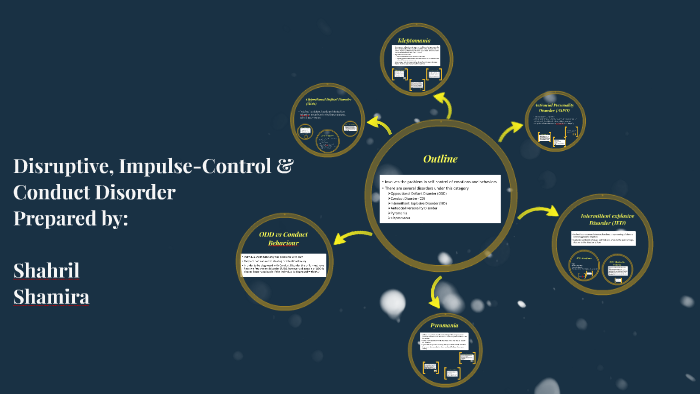In general disruptive impulse-control and conduct disorders tend to be more common in males than females with the exception of kleptomania. Typically the resulting behaviors or actions are considered a threat.

Disruptive Impulse Control Amp Conduct Disorder By Shamira Mohammed On Prezi Next
DISRUPTIVE IMPULSE CONTROL AND CONDUCT DISORDERS Disruptive impulse control and conduct disorders.

. DSM-5 has a new chapter on disruptive impulse-control and conduct disorders. SANA KAINAT Impulse Control Disorders Impulse control disorders are characterized by four main qualities which include. Ad Discover the surprising causes and risk factors of conduct disorder today.
Up to 10 cash back The disruptive impulse-control and conduct disorders are a group of diagnoses in the Diagnostic and Statistical Manual of Mental Disorders 5th ed. They are characterized by impulsivity failure to resist a temptation urge or impulse. Whereas those with internalizing disorders direct their distress inwardly onto themselves ego-dystonically.
33 rows Disorder Class. There is increasing awareness that impulse control disorders ICDs including pathological gambling hyper-sexuality compulsive eating and buying can occur as a complication of Parkinsons disease PD. Are combined in the DSM-5 are characterized by emotional and behavioural self-control problems that lead to violation of the rights of others or bring the person into conflict with societal norms or the authority figures These disorders which often coexist with other.
Problematic behaviors and issues with self-control associated with these disorders are typically first observed in childhood and can persist into adulthood. Disruptive Impulse-Control and Conduct Disorders are a group of psychiatric disorders that can cause individuals to behave violently or aggressively toward other people creatures or property. The disorders we have covered in this module represent a wide range of symptoms involving a combination of biological causes emotional difficulties and sociocultural influences.
Further the definition of Disruptive Impulse-Control and Conduct Disorders provided in the DSM-5 recognizes that disorders in other chapters of the DSM also involve problems in emotional and behavioral regulation but considers the disruptive disorders distinct by the problems in self-control being manifested primarily in behaviors that violate the rights of. Disruptive Impulse-Control and Conduct Disorders. Common Types and Treatments The term impulse control disorder is a category of mental health problems that include disruptive impulse-control and conduct disorders.
Disruptive impulse control and conduct disorders are a group of disorders that are linked by varying difficulties in controlling aggressive behaviors self-control and impulses. Disruptive impulse-control and conduct disorders. DISRUPTIVE IMPULSE CONTROL AND.
The perpetuation of repeated negative behaviors regardless of negative consequences Progressive lack of control over engaging in these behaviors Mounting tension or craving to. This may bring some needed attention to disorders that remain poorly understood frequently undiagnosed and. Additional mental health issues such as bipolar or personality disorders often coexist in people with an impulse control disorder.
Disruptive disorder impulse-control disorder and conduct disorder are a group of psychiatric conditions that affect the self-regulation of emotions and behaviors beginning in childhood or adolescence. Examples of impulse control disorders include oppositional defiant disorder conduct disorder intermittent explosive disorder kleptomania and pyromania. The biopsychosocial perspective therefore seems appropriate in understanding each of these.
American Psychiatric Association 2013These diagnoses may be used to characterize a range of maladaptive patterns of function related to problems with emotional or behavioral self. A pattern of negativistic hostile and defiant behavior during which a child often loses her or his temper often argues with adults and often actively defies or refuses to comply with adults requests or rules. Recurrent behavioral outbursts representing a failure to control aggressive impulses as manifested by either of the following.
Disruptive Impulse-Control and Conduct Disorders Oppositional Defiant Disorder ODD This may be evident through frequent loss of temper persistent arguments with adults defiance of rulesrequests deliberate annoyance of others frequent blame of others for ones mistakes and frequent displays of anger resentment spite or vindication. Verbal aggression or physical aggression toward property animals or other individuals occurring twice weekly on. Learn the surprising causes and risk factors of conduct disorder right now.
Disruptive impulse-control and conduct disorders are characterized by disturbances in behavioral and emotional self-regulation. They belong to a group of disorders that involve oppositional defiant disorder intermittent explosive disorder conduct disorder. Disruptive Impulse-Control and Conduct Disorders Page 124 Virginia Commission on Youth outbursts are impulsive or based in anger and are not meant to intimidate or to seek money or power.
A repetitive and. In addition other impulsive or compulsive disorders have been reported to occur including do. Disruptive Impulse-Control and Conduct Disorders A.
The disorders encompassed within impulse control disorder ICD are identified as externalizing disorders as these individuals express hostility and resentment externally made manifest by conflicts with others. Also the criteria are not met for disruptive mood dysregulation disorder. Affected individuals behave in a way that makes others uncomfortable eg aggression destruction of property andor in a way that significantly conflicts with.
An impulse control disorder is a condition in which a person has trouble controlling emotions or behaviors. DISRUPTIVE IMPULSE-CONTROL CONDUCT DISORDERS CRITICAL TO REMEMBER Many of the symptoms that define disruptive impulse-control and conduct dos are behaviors that can occur to some degree in typically developing individuals. Or an inability to control emotions and behaviors.
Finally the outbursts must cause the individual considerable distress impair his or her occupational or interpersonal. Often the behaviors violate the rights of others or conflict with societal norms and the law. Disruptive impulse-control and conduct disorders involve much more critical and constant behaviors than typical temporary episodes of most children and adolescents.
Unspecified disruptive impulse-control and conduct disorder. Learning Objectives Summarize the similarities and differences in diagnostic criteria etiology and treatment options.

Disruptive Impulse Control And Conduct Disorders Clinical Practice Osmosis

0 Comments